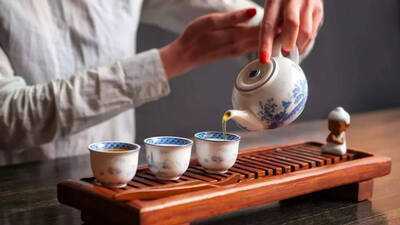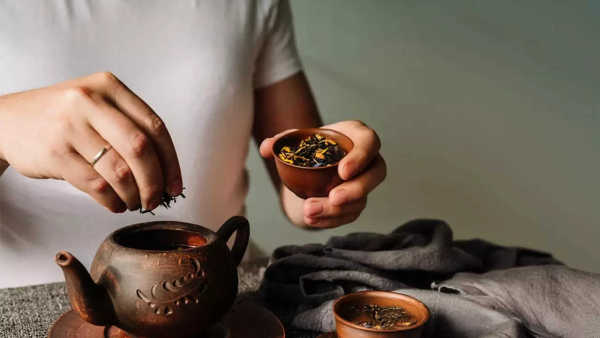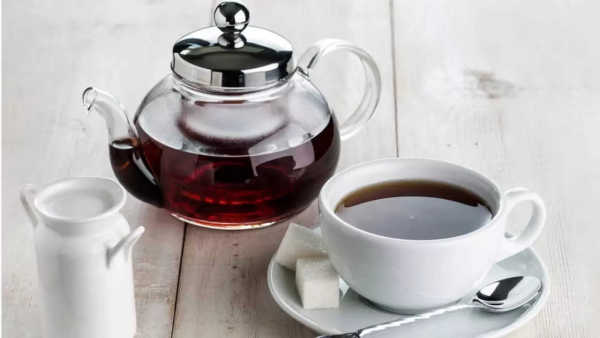
Being a teetotaller is not just about being ‘addicted’ to drinking tea! Because, if there’s one drink that has been touted as one of the most beneficial drinks - it’s tea. People have consumed tea for thousands of years and have believed it has many health benefits. In ancient times, tea was considered a medicine and a cure-all. From improving mental clarity to boosting concentration - tea has been a reliable companion through centuries. Not just that, tea has been treated as a medicinal drink as well, to the extent that it can be used as an elixir for longevity too!
Tea - the elixir of a long life!
A 2022
study of nearly half a million people found that those who regularly consume at least 2 cups of black tea per day had a 9-13% lower risk of premature death.
Tea drinkers were also less likely to die of a heart attack or stroke. Because the study is observational, it can’t say for certain that drinking black tea will add years to your life. Still, it’s not the first study to suggest that drinking tea may play a role in longevity.

Benefits of Black Coffee:
When it comes to what to drink to improve your health, green tea often steals the spotlight. From providing essential anti-oxidants to working as an anti-inflammatory agent, green tea covers it all.
However, if you’re curious about living longer, there’s another brew you'll want to add to your pantry. As per Vandana Sheth, RDN, CDCES, FAND, a Los Angeles-based registered dietitian, who told Eating Well, "Incorporating black tea into your routine can be an enjoyable and easy way to support longevity and overall health.”
High in Antioxidants:
Black tea is rich in antioxidants — plant compounds that have been shown to help protect against chronic disease and support healthy aging. Unlike other forms of tea, black tea leaves are fully oxidized, resulting in the formation of antioxidants that aren’t as prevalent in other tea varieties. Specifically, black tea is high in groups of flavonoids called theaflavins and thearubigins that have been linked with benefits for chronic inflammation and disease prevention.
As per Sheth, "These compounds significantly enhance black tea’s health-promoting properties, including antioxidant and anti-inflammatory effects.”
May Support Heart Health:
Heart disease is the leading cause of death in the United States. Thanks to its antioxidant content, research suggests that drinking black tea might help lower your risk of this common disease. Studies have also found black tea to help improve blood pressure levels.
As per Sheth, "Hypertension is a major risk factor for cardiovascular morbidity and mortality, so healthy blood pressure is key for longevity.”
Besides, black tea can help reduce inflammation and oxidative stress in the body, which can prevent heart disease, cancer, diabetes, and stroke. The l-theanine is a non-protein amino acid that can promote relaxation, enhance cognitive performance, and help with stress, which by extension - can promote longevity.
How to brew black tea that promotes longevity:
Adding black tea to your morning routine is a simple way to support longevity. Here are the simple steps you can follow to brew your cuppa.
 Use loose-leaf tea:
Use loose-leaf tea:
As per Jennifer House MSc, RD, a family dietitian and founder of First Step Nutrition, “Loose-leaf tea may be more potent than tea bags.” For brewing loose-leaf tea, make sure to have a strainer or package of reusable teabags on hand.
Brew for at least 3 minutes:
As per Sheth’s recommendation, steeping black tea for 3 to 5 minutes to extract more antioxidants from the leaves. Just keep in mind that the flavor of your tea will get stronger, and likely more bitter, the longer you brew it.
Skip the sugar:
The sweeter, the better? Not in case of the black tea though. As per House, "Sugar can negate some of the black tea's health benefits, such as its potential to prevent stroke." If you dislike the taste of plain black tea, House recommends buying varieties that are flavored with dried flowers or herbs. You can also use a natural sugar alternative, like monk fruit, or try adding lemon, ginger, or cinnamon for a punch of flavor.
Add lemon juice:
Black tea contains tannins, which can block iron absorption. If you’re drinking black tea with a meal, Sheth recommends adding a squeeze of lemon juice to your tea or making sure you have at least one vitamin C-rich food on your plate to improve iron absorption.
Drink twice a day:
While there’s no magical number, research suggests that drinking at least 2 cups of black tea daily may offer the most benefits. To keep your cup exciting, try experimenting with different types of black tea, like Darjeeling, Assam, or Ceylon. Keep in mind that black tea has caffeine. If you’re sensitive to caffeine, you may want to stick with just one cup.
Don't drink black tea before bed:
Getting a good night’s rest is also important for longevity. Because black tea contains caffeine, House recommends drinking it in the morning or early afternoon so it doesn’t interfere with a good night’s sleep.


